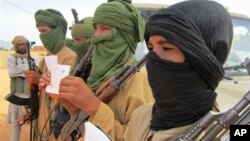The United Nations Children's Fund reports that armed groups in the Central African Republic are continuing to recruit child soldiers. UNICEF condemns this practice, calling it a grave violation of international law.
The U.N. Children’s Fund is calling for an immediate stop to the recruitment of child soldiers by armed groups in the Central African Republic. UNICEF is warning leaders they will be held responsible for this practice, which is a breach of international law.
The agency says the CAR has a history of recruiting child soldiers. It says before fighting began between the government and Seleka rebels in December, more than 2,000 boys and girls were associated with armed groups. It adds both sides in the conflict were recruiting children.
UNICEF spokeswoman Marixie Mercado says last month's takeover of the capital, Bangui, by the rebels has not stopped the recruitment, although the number of new recruits is not known.
"We have verified cases, but no precise number. What we are hearing from partners in the field is that there has been an increase in terms of the geographic scope and the magnitude of the practice… Children are recruited to be used as spies, porters, messengers, cooks, in addition to fighting on the front lines as well," Mercado said.
Since 2007, UNICEF reports over 1,000 girls and boys have been released from armed and self-defense groups in the CAR. Mercado says the agency and its partners have worked to rehabilitate these children and re-integrate them into their communities.
She says the new authorities in Bangui indicate they plan to identify and release children among the ranks of armed groups. She says UNICEF is ready to participate in this process and will try to ensure no new recruitments take place.
But, she notes there are no guarantees of success, as the chaotic situation in the country is exposing children to multiple dangers.
"The past four months of widespread lawlessness and insecurity and lack of access by humanitarian workers to large parts of the country is placing children at greater risk than ever. Almost all schools across the country are now closed and the health facilities we have been able to assess have been severely looted. UNICEF and the International Committee of the Red Cross have secured water treatment supplies for the next few months in Bangui. The situation outside the capital is unclear because access is extremely difficult," Mercado said.
Mercado warns access to the remote northern parts of CAR will get worse once the rainy season begins in April and May.
UNICEF is calling on the new authorities to abide by their obligations to protect children. It is urging them to provide law and order so humanitarian agencies are able to reach the children, families and communities that so desperately need assistance.




